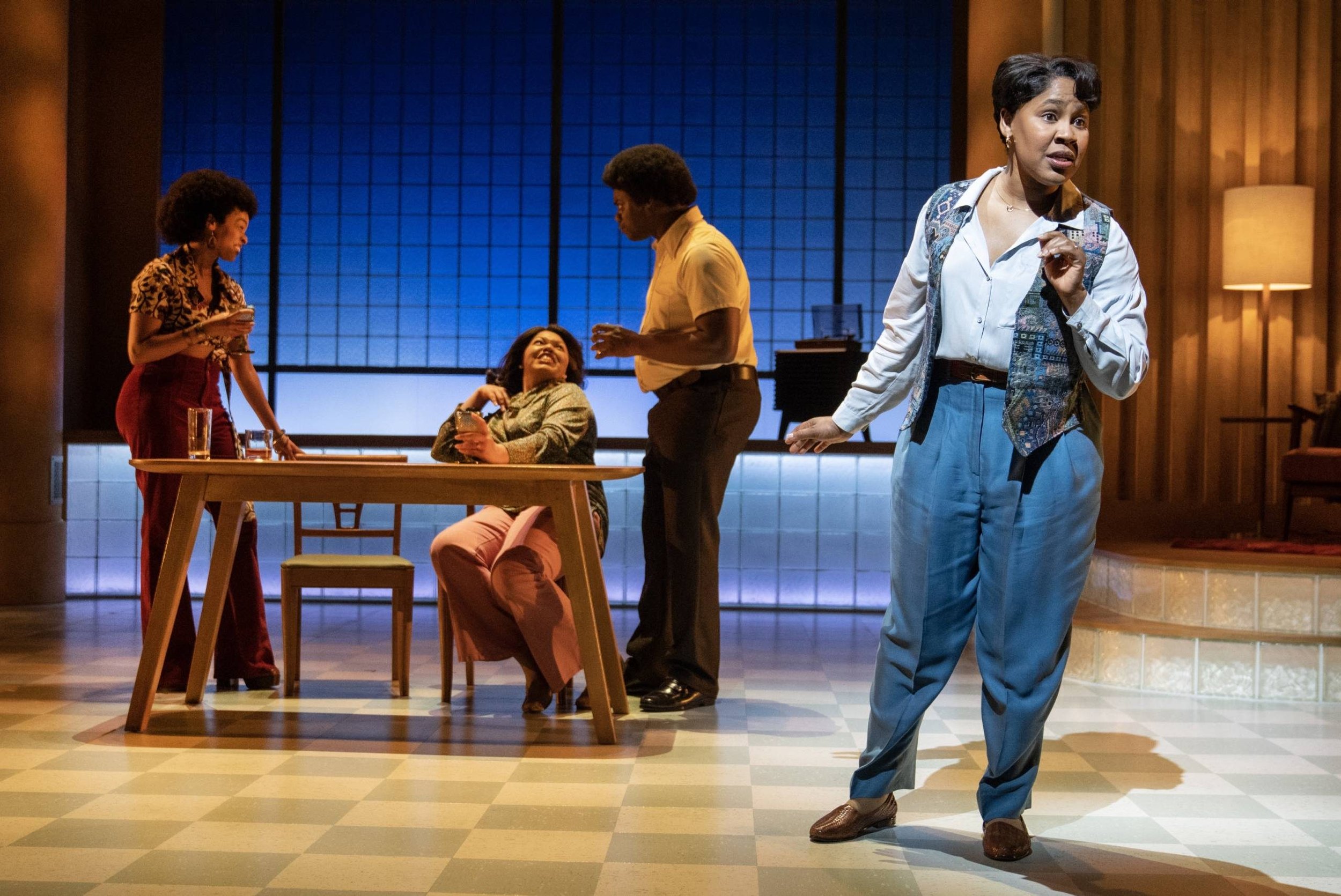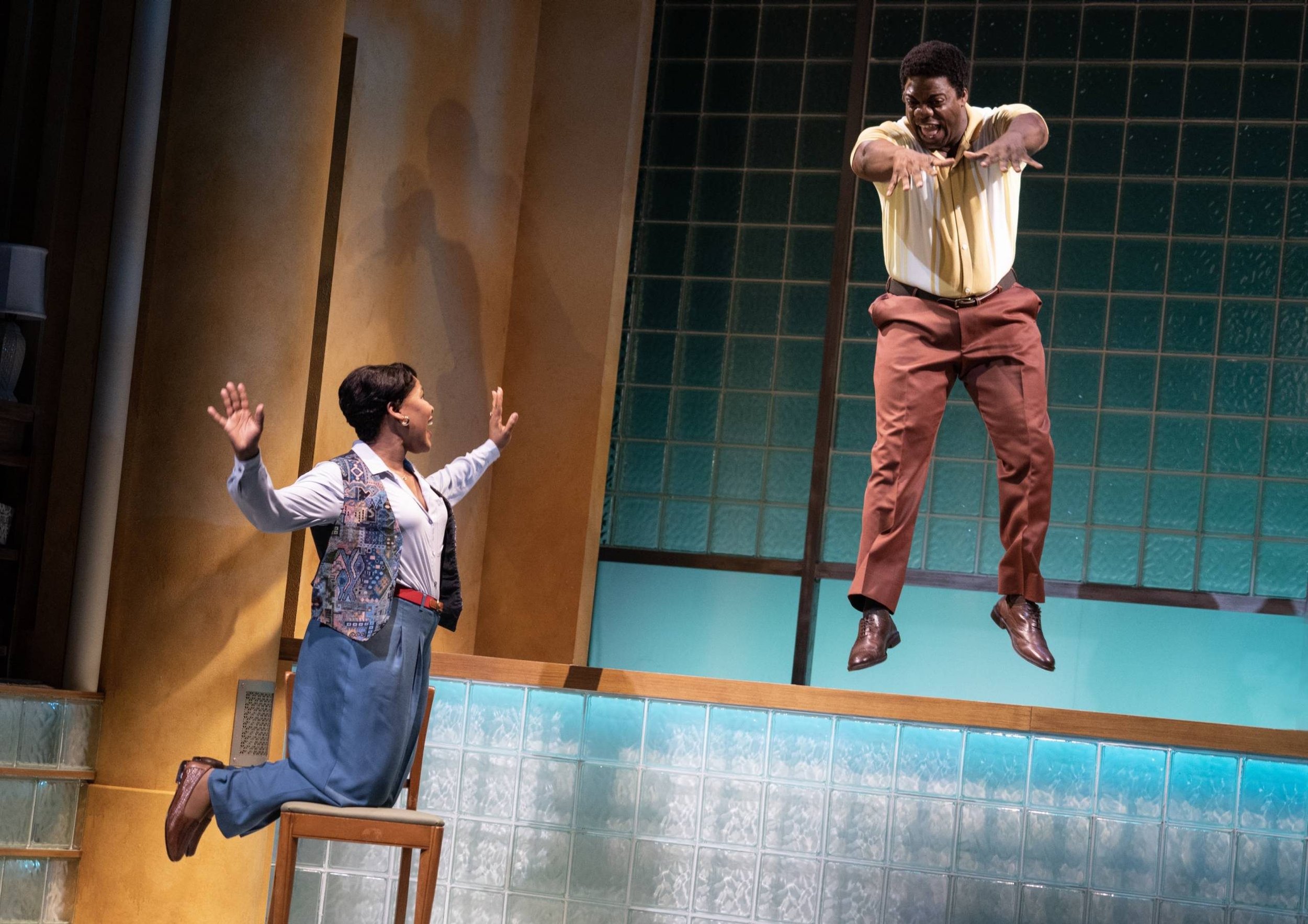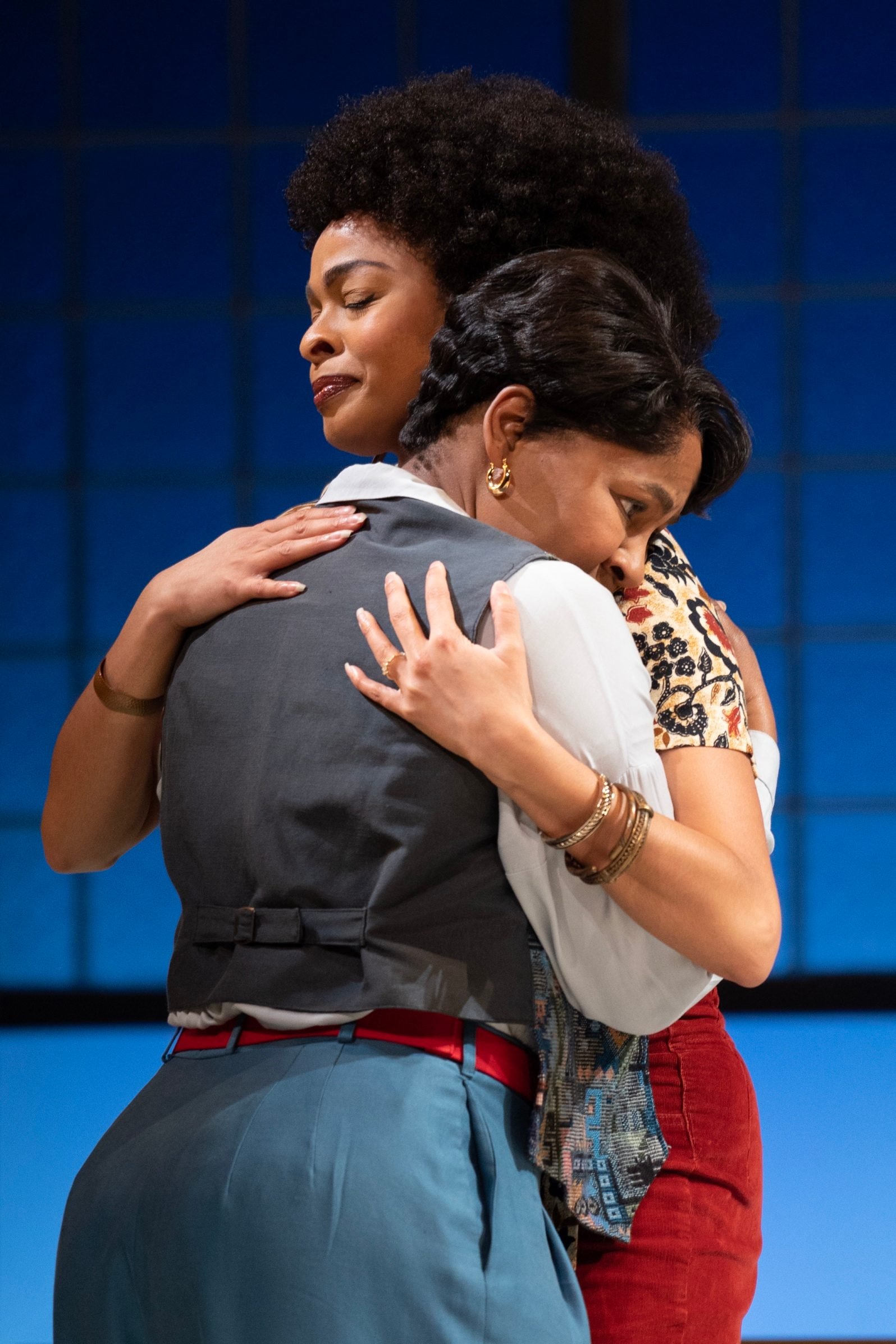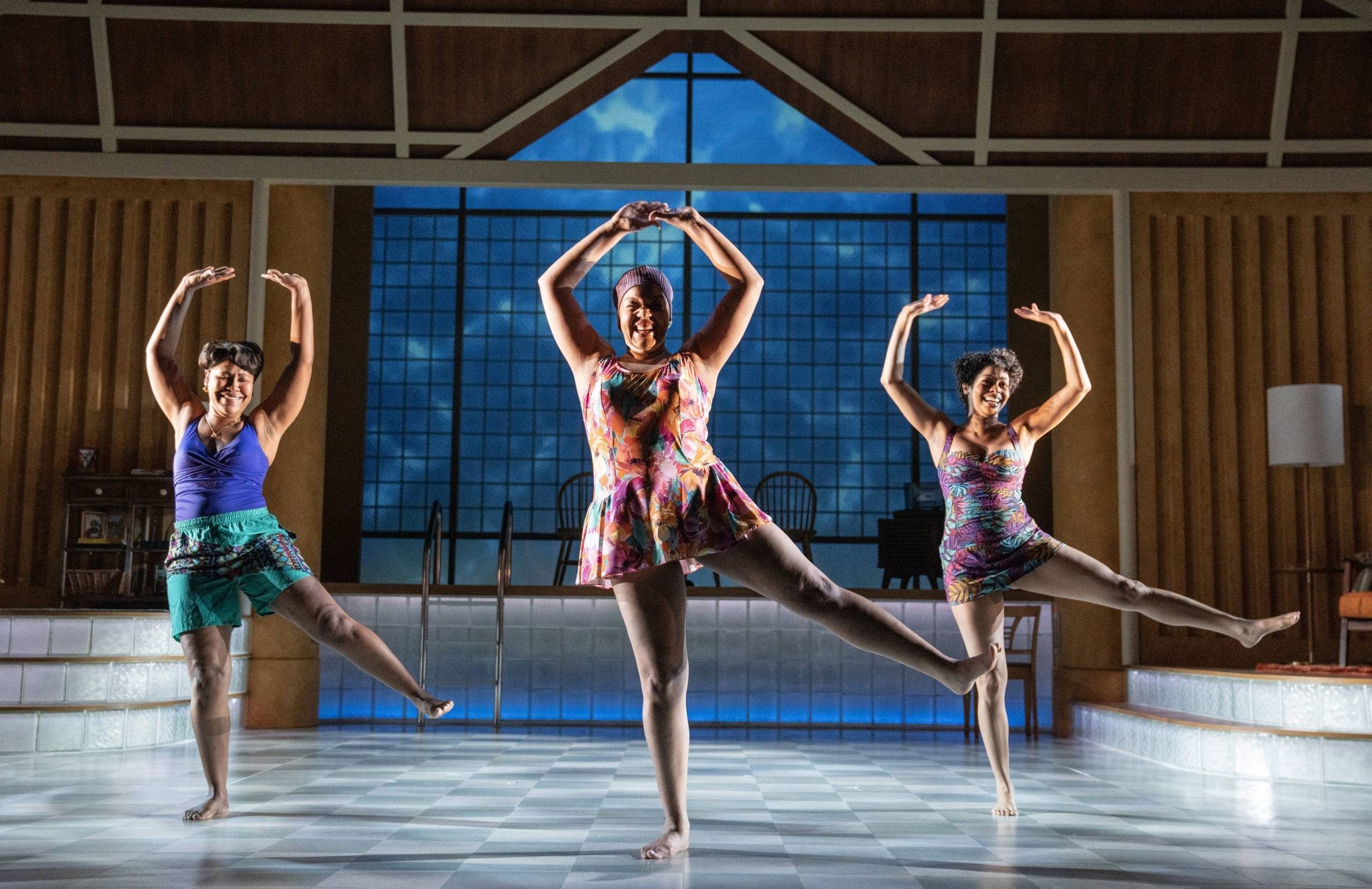Review of the ripple, the wave that carried me home, Yale Repertory Theatre
Think of swimming pools, those oases of exclusion. Do you “belong” to the pool? That’s the question I remember from back there in my suburban Sixties. If you “belong,” you can swim. If not, not. And in segregated communities it was clear at once who belonged and who didn’t. That state of affairs—from her parents’ childhood and her own—is what has come back to haunt Janice (Jennean Farmer), an African American woman who left behind her father’s hometown of Beacon, KS, a long time ago. The agent of memory: Young Chipper Ambitious Black Woman (Adrienne S. Wells), a relentless voice—indeed, very chipper—leaving messages on her machine, in an effort to have Janice come back for a tribute to her dad, who fought for desegregated access and for pools for Blacks, and the dedication of a pool in his name.
Gayle (Adrienne S. Wells), Helen (Chalia La Tour), Edwin (Marcus Henderson), Janice (Jennean Farmer) in the ripple, the wave that carried me home at Yale Repertory Theatre (photo by Joan Marcus)
Christina Anderson’s evocative memory play, the ripple, the wave that carried me home is long on exposition, layering in a lots of details across a range of eras to give context and political implication to much of what Janice, who speaks directly to the audience a good deal of the time, wants to impart to us. Jennean Farmer presents Janice in a forthright, engaging way but we might sometimes wonder why she’s telling us all this; that question is effectively offset by the fact that Janice herself is not altogether sure. She’s navigating her past, looking for where the flow of memory snags, as it were. Farmer is particularly adept at rendering the very fluid ages in which we see Janice and their different contexts.
The scenic elements of the play—most involving her parents Edwin (Marcus Henderson) and Helen (Chalia La Tour) and Aunt Gayle (Adrienne S. Wells)—play as enacted recollections which lends them a kind of detachment that, as the play goes on, even begins to supply a certain element of wish fulfillment. Janice is trying to figure out the past, to find a relation to her father and mother that lives up to the truth but which also lets her find meaning she can value. And that’s the throughline that holds us: because there are some rough patches Janice has to cope with and how they register will say much about their ultimate status in her sense of herself. The way “who we were when” tends to.
Janice (Jennean Farmer), Edwin (Marcus Henderson) in the ripple, the wave that carried me home at Yale Repertory Theatre (photo by Joan Marcus)
Early on, Edwin tells his young daughter a funny story of how he and some friends crashed a segregated pool—the story, in Henderson’s spirited delivery, is told for laughs, to hear how audacious the boys were and how appalled all the white folks were. The trespassers were never identified and so got away with it. Then comes the punchline and it’s a punch in the gut: the pool was closed so that it could be fully drained and refilled, as if it had been “infected.”
Helen (Chalia La Tour), Janice (Jennean Farmer) in the ripple, the wave that carried me home at Yale Repertory Theatre (photo by Joan Marcus)
So, while Janice is proud of her parents and their activism, there are a lot of sore points that resurface in those waves of memory. Another, much more harrowing, involves her mother and escalating humiliations and affronts that ultimately have Janice rethinking which of her parents should be getting the tribute. That question—while never overstated—remains present throughout. While Henderson’s Edward is mostly a likeable figure (check out that dance!), there’s a sense in which the ethos of the dominant male requires more than interrogation: it must be supplemented if not supplanted entirely. In a wonderfully modulated performance, Chalia La Tour’s Helen captures a particular woman at very particular moments in her life, with a dignity that is unshakeable. She’s a woman with a “life plan” who has so many hopes checked by strategies of bigotry and exclusion, and yet her strength is unyielding. The look on her face in the final pool exercise routine is priceless, such measured joy barely contained.
Janice (Jennean Farmer), Gayle (Adrienne S. Wells) in the ripple, the wave that carried me home at Yale Repertory Theatre (photo by Joan Marcus)
Likewise Adrienne S. Wells’ Aunt Gayle at times made me want to watch an alternative play: the Aunt Gayle Story. For Janice is one of those over-earnest narrators for whom each incident must be milked for all possible trauma or joy, whereas Gayle is someone with a much more even sense of life; her reactions to the trial of the LA policemen who beat Rodney King help create a context of low expectations and ongoing outrage. Wells says so much with how she holds her head or moves, she’s a great asset to this production.
Woodward’s cast moves in and out of times and scenes seamlessly, able to signal the emphases that Janice finds while reliving these stories for us. While the production’s efforts to enact the particulars of this particular past are laudable, it’s not a play that ignites into great passions the way a less mediated presentation might. All along we’re aware that Janice is fine, and narrating, and that the harrowing past—with its confrontations, triumphs, setbacks, joys and sorrows—is only there if she wants to revisit, to find again what lessons can be learned. The King repercussions create a moment when even Janice—apt to feel superior to Chipper—can hug her “like strangers, like family, like sisters, like aliens traumatized by our time on this dysfunctional planet.”
Janice (Jennean Farmer), Young Chipper Ambitious Black Woman (Adrienne S. Wells) in the ripple, the wave that carried me home at Yale Repertory Theatre (photo by Joan Marcus)
Ultimately, we gain a sense of how fraught is the business of dramatizing the past, a factor that a searching playwright like Christina Anderson is willing to make thematic to the task of playwriting itself. The characters and their presentation are motivated by the need to tell stories that have both communal and personal resonance. If the ripple, the wave that carried me home may be a bit too overt in its effort to present the confluence of the personal and political, it also is unafraid to attest that, as Edwin says, “this country is built on selective memory.”
If so, a different selection might build a different country.
Janice (Jennean Farmer), Helen (Chalia La Tour), Gayle (Adrienne S. Wells) in the ripple, the wave that carried me home at Yale Repertory Theatre (photo by Joan Marcus)
the ripple, the wave that carried me home
by Christina Anderson
directed by Tamilla Woodward
Scenic Designer: Emmie Finckel; Costume Designer: Aidan Griffiths; Lighting Designer: Alan C. Edwards; Projection Designer: Henry Rodriguez; Sound Designer: Evdoxia Ragkou; Hair and Makeup Designers: Hannah Fennell Gellman, Eric M. Glover; Technical Director: Nate Angrick; Vocal Coach: Julie Foh; Intimacy and Fight Director: Kelsey Rainwater; Casting Director: Calleri Jensen Davis; Stage Manager: Andrew Petrick
Cast: Jennean Farmer, Marcus Henderson, Chalia La Tour, Adrienne S. Wells
Yale Repertory Theatre
April 28-May 20, 2023





